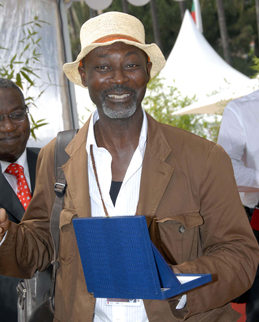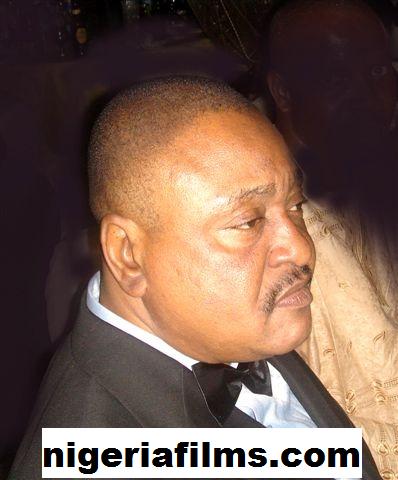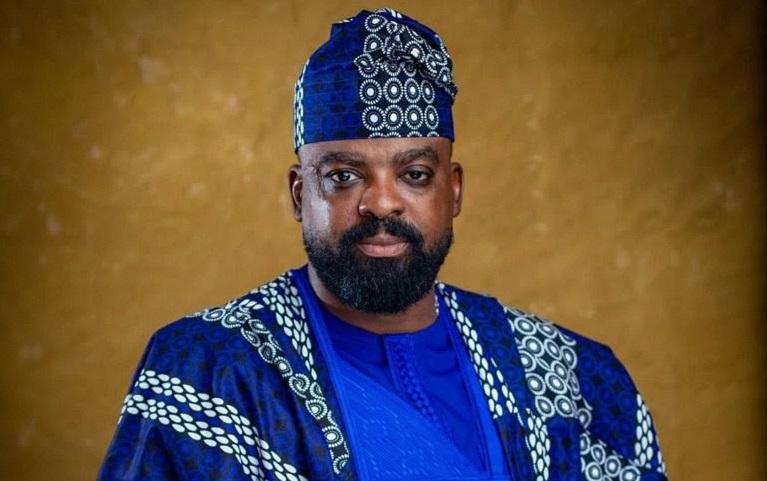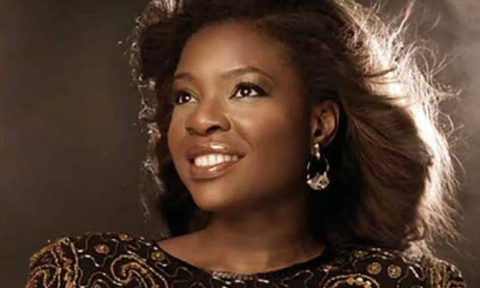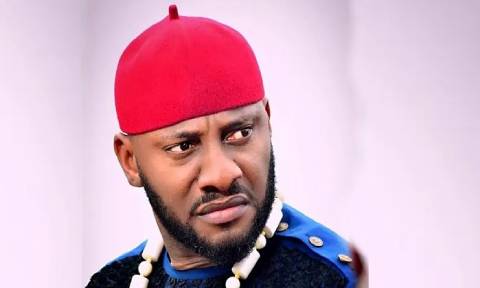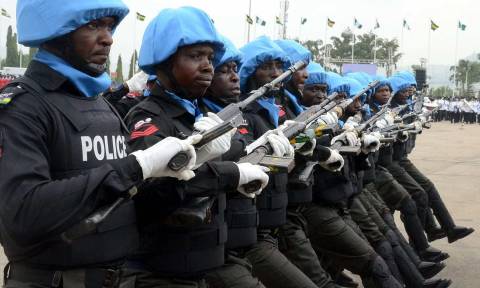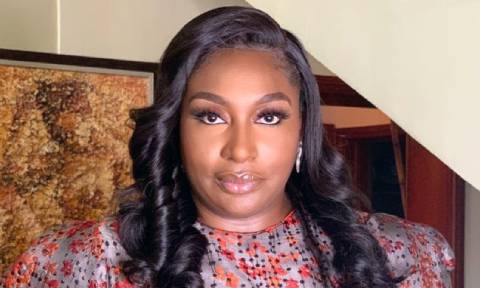Tunde Kelani is the Managing Director of Mainframe Film and Television Productions. He is also the producer of award-winning feature videos. TI Oluwa Nile (Part 1 – 3), Ayo Ni Mofe (Part 1 & 2), Kosegbe, O Le Ku, Saworoide, Thunderbolt, A Barber’s Wisdom, Arugba, and others. Kelani also has
strong interest in the theatre which he believes is best medium to begin with as an artiste. In this interview with TONY OKUYEME, this thespian per excellence of the Nigerian film sector reveals his experience with the stage, why he believes that Nigerians should think of commemoration instead of celebration and other matters.
Even a first time visitor does not need to be told that the man behind Mainframe Production is in the arts. The staircase to his office on the upper storey of the building is adorned with beautiful paintings which hang on various parts of the wall.
Inside his office are signs of a man who has been very successful in his chosen career evident in the over a dozen awards on the table at a corner of his office. Three different cameras reflecting different generations of technology adorn his table. You realize then that you are in the office of an individual interested in documenting history. Simple and unassuming, Tunde Kelani, simply refered to as TK by his colleagues, friends and admirers, is a journalist’s delight, especially when the issue is on film and the Nigerian arts and culture. So much has been written about him and when you ask him to tell you the story of his rise to fame; you are confronted with the question: “You people already know much about me. So what else is there to be said?” But the multiple awards winning filmmaker who holds a diploma in the art and technique of film-making from the London International Film School, London, understands why, and begins narrative that offers insight into his world of filmmaking and what he thinks of the industry.
“In my first year in the primary school, I discovered the camera, and actually bought one that was more of a toy than a working camera. I think that my interest in photography just grew up quite naturally. I was fascinated by this thing that reproduces something literally. When they say won fo foto in Yoruba, it means that they wash it and the image would appear. So I was just fascinated by that,” he says, setting the stage for sharing his experience with the camera. He recalls every moment with palpable nostalgia.
“I think the earliest stupid thing that I did was to take picture from a newspaper, put it in the bucket, put water, and tried to wash it as if something would happen. Of course nothing happened; the paper got soaked. I was disappointed. Later I found a boy who had camera, and I bought it from him. But it never worked. So from secondary school at Abeokuta Grammar School, I bought my first camera which was a Kodak 127. I was then about 15 years old. It was very simple to operate. Just load the film, roll it, and click. It was that simple. And after that I will send it to the laboratory, and it took three days for me to get a result of what I have done. It was exciting because I could hardly sleep. But I discovered quickly that it was not what I needed. So I ordered for a camera then called Rapia Mark 2. then. That was how my journey in photography started. By the time I left secondary school, I had invested so much time and money on learning photography, practicing it. In fact by the time I got into my final year in secondary school I had bought my first DSLI (Digital Single Lens Interest) camera called the Halina 35X. It was close to being a professional. It was a question of trial and error. So it was clear when I was leaving secondary school that I could be only one thing, I could only be a photographer.”
According to him, his father wanted him to study Pharmacy at the University of Ibadan. But I did not; I could not,” he disclosed, adding that his dream was to become a photographer. Finally I got an opportunity as an apprentice photographer, after working as a clerk in A.J Seward factory. I wrote several photographers; I applied to them, and Dotun Kubanjo and Associate in Broad Street, Lagos, took me as an apprentice photographer. When he said he was not going to pay me, and I agreed, he asked me to go and bring my father. So my father came and they discussed and I started.”
However, he did not spend more than one year there because he was attracted to motion pictures as well.
“I had seen the big American films that were brought to Lagos. We were staying in Ebute-Metta, Lagos. We had sumiros Cinema, Regal Cinema, Central Cinema, Odion Cinema and Casino Cinema. And of course, we also have Metro Cinema in Palm Groove area, the Aredo Cinema at the back. And on the Island, I used to go to Plaza Cinema, as well as Roxi Cinema in Apapa. I saw all the big American films. I saw the Ten Commandments, and others. All those big pictures made big impression on me.
“So before my first year ended at Dotun Ogubanjo Associates, there was an advert in Daily Times. I read the Daily Times because I just wanted to see the credits, the bi-lines of the great photographers, such as photo by Peter Obey, photo by Akin Adedayo, among others. It was while I was going through the paper that I saw the advert by the Western Nigerian Television (WNTV) for trainee film cameramen, and all they asked for was West African School Certificate Examination (WASCE) and an aptitude in photography. I felt I was more qualified than anybody else. So I applied for it, and 15 of us were to WAEC office at Yaba, Lagos, for an aptitude test. At the end of the aptitude test, four of us were invited for an interview in Broadcasting House in Ibadan, and the end, I was the only one selected. That is how my career in cinematography started at WNTV in Ibadan. I was trained there under the best African broadcasting managers like Teju Oyeleye, Ayo Ogunlade, Vincent Maduka, Sam Adegbiye, and other big broadcasters then. I have experienced all the technology there is to making motion pictures.”
How has he been able to combine cinematography, producing, directing and mentoring? He hints that training in London was very useful. “I did a five-year diploma course in London that was called the Arts and Technique of Filmmaking. When you come in for the course, specialisation is discouraged. So you must learn everything. I think a good filmmaker should be skilled at least in two or three areas. So I started from photography, and naturally, I am good at cinematography. But I am good at story telling also. I am a story teller basically, but I have chosen the medium of film to tell the story. So I am at home with all the areas of making films. I initiate a project; I bring in all the other expertise. But I know what is going on. I collaborate with writers, art directors, production designers, artistes, musicians and others.
Kelani believes the Nigerian filmmakers have given the country something to be very happy about in spite of the various challenges of working in Nigeria. “I think so far, so good because of Nigeria’s peculiar circumstances within our journey into nationhood for 50 years. We were able to give the world an important aspect of African cinema, that is, cinema that is made by the people, for the people, and then funded by the people. The impact or power of such a medium is that it is acceptable by the audience. You find a connection with the audience.
“The challenges have been the lack of infrastructure and the institutional backing that the industry needs. Nigeria is not particularly a friendly environment to make a film. You cannot make a film without constant electricity; you cannot make a film without water; you cannot make a film without good roads. Those are the main challenges.”
On the other hand, he posits, the technology has been an advantage to the Nigerian filmmakers. “We lost all the cinema infrastructure. But we are now in digital era, and that gives us access to the means of production, and we are able to tell our stories effectively.”
For most people, managing fame could be an arduous task, especially so that one does not get carried away. How then does he manage fame given his status in both the industry and in Nigeria? You ask him. “No! No! No!” He responded amidst guffaw, adding “I am not a star; I am not a glamorous person.” Humble and unassuming, the London trained filmmaker does not considers himself a star, he insists he is not obsessed with fame but simply enjoying himself doing his work. For a film maker of his status and caliber both at the national and the international levels, with over a dozen awards, this is no doubt striking and inspiring. “I am just a facilitator. So I use those elements in my work. The attention is not on me because I am not in front of the camera; I am behind it. So it is the stars that have the fame. I don’t have the fame. I just enjoy my work. I have a passion for my work, and I am grateful to God for it.
“I have worked in almost everybody’s project in my capacity as a cinematographer. I have worked in Hubert Ogunde’s productions, Ola Balogun’s productions and others. But I shot some of the earliest films on celluloid. Since we started Mainframe Productions, I think I have done about 12 films or so.
“The theatre also enhanced my creativity as an artiste and a film maker.”
Nigerian golden jubilee celebration has attracted a lot of comment and criticism especially regarding elaborate celebration. While many have posited that the country is still very far from the desired progress as a nation and therefore there is nothing really to celebrate, does agree with this position or does he believe there believe there is reason to bring out the drums, put the dancers on stage for celebration? “Yes there cause to celebrate,” he says, but adds that celebration is actually not the right word for it. “Well in the industry, I think we can say that we should have a commemoration, not really a celebration because we still have a long way to go. We have enormous challenges in our young industry.
“We are well positioned because we have managed to give Nigeria a brand successfully. So we have some cause to celebrate at least in getting so far by putting Nigeria on the map. But the challenges to consolidate and demonstrate to the whole world that we are on the way, and that we know what we are doing. We should start thinking of how we are going to come up with the next generation of Nigerian cinema.
On developments in the culture sector 50 since independence, he describes the situation as worrisome. “We have to start a process of reorientation in our culture. We can only develop through our culture. God has given us everything we need but we have abandoned it. Look at other great cultures. China, for instance, is a world economic power because they have used their culture. There is a lesson we can learn from that,” Kelani notes.
